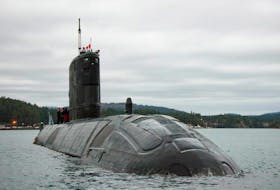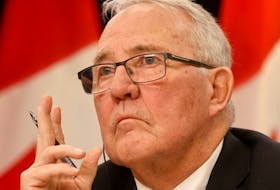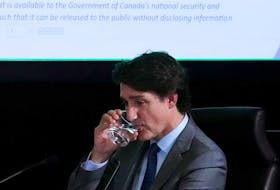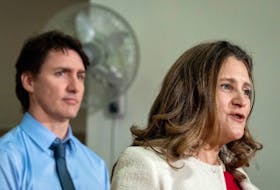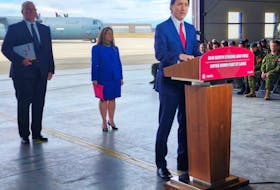When Chrystia Freeland was appointed finance minister, I dispatched a tweet about the prime minister having replaced someone with extensive business experience with a journalist.
“As a journalist, I find that concerning.”
It was intended to be mildly amusing – an echo of Jerry Seinfeld’s concern that his dentist had converted to Judaism for the jokes. (“Does this offend you as a Jewish person?” “No, it offends me as a comedian.”)
It was meant to question the suitability for the finance job of anyone from my own craft – the ultimate proponents of power without responsibility.
It certainly was not intended to be openly sexist, as it was interpreted by some of the 378,000 people who saw it on the great social media outrage machine.
Anyone who has ever met Freeland knows she has brains enough for two, which should come in handy in her role as deputy prime minister.
The new finance minister displayed her cognitive abilities in a press conference on Tuesday, when she outlined her views on the Liberal government’s fiscal approach.
“Canada has a hard-won and well-deserved reputation at home and around the world for wise and prudent fiscal management…That is a policy our government will continue,” she said.
The previous bluster about budget-busting levels of spending was quite absent.
No wonder. Freeland revealed she has been consulting widely on the fiscal picture, including with former prime minister, Paul Martin.
It seems logical that Martin may have offered counsel similar to that submitted by his former deputy minister, David Dodge, in a new report for the Public Policy Forum.
Canada’s brand is tarnished and we are no longer seen as a great place to invest, he said – an opinion backed by a CEO friend, who told me every new job his company creates is outside this country.
The former Bank of Canada governor said that without the net surplus of energy exports (90 per cent from oil and gas), the federal government wouldn’t have the revenue necessary to attempt a green recovery.
He said that even in an era of low interest rates and central bank intervention, Canada needs to maintain international confidence to keep those rates low and preserve the value of the dollar. He said governments can help by creating a more hospitable climate for investment and spend its tax dollars on things that will produce economic growth. He advocated tapering government borrowing, so that deficits hit one per cent of GDP four years from now, stabilizing debt servicing costs at a “manageable” 10 per cent of revenues.
This is the kind of “fiscal orthodoxy” that former finance minister Bill Morneau was promoting. It doesn’t particularly fit with Freeland’s views during her time as a journalist, when she was more concerned with distribution of wealth than growing it.
But the weightlessness of journalism is not comparable to the burdens of office. In Freeland’s former profession, words were wrapping fish within days; in her current job, they have consequences, and they come back to haunt you if they are unintended ones.
As such, a number of her colleagues believe her fall economic update will have a clear fiscal anchor to send signals to international markets about Canada’s continued fiscal restraint. “I think she gets that,” said one Liberal MP.
That’s what smart people do – they constantly review and reconsider things on which they thought they had a fixed point of view.
It’s less clear that the prime minister is open to any challenges to his way of thinking.
In his press conference at the end of a three-day Cabinet retreat, he talked a “responsible and ambitious” plan – a description that borders on the oxymoronic in the current straitened circumstances.
He referred to gaps in the social safety net and “building back better” in the form of a “new and more durable, sustainable economy.”
That suggests elements of a green energy plan will emerge in the throne speech and subsequent economic update, if not the whole ecological enchilada.
Right on cue, a group of policy, finance and green thinkers, including Trudeau’s former principal secretary, Gerald Butts – the Taskforce for Resilient Recovery – released its final report, which recommended the government spend $55.4 billion over five years on clean initiatives.
As these things go – and they usually go nowhere – the report is realistic and practical. The authors identify policy levers and potential partner organizations.
It suggests half of the government’s investment should be geared to making buildings across the country resilient and energy-efficient. This would be done in part by focusing the under-utilized Canada Infrastructure Bank on retrofitting public, commercial and institutional buildings; in part by providing funding to the Canada Mortgage and Housing Corporation to incentivize residential retrofits.
Given the number of jobs such a policy might create, it could be a political winner.
Other funds would be used to jump-start production and adoption of zero-emission vehicles; accelerate the green energy sector; speed the adoption of clean technology, and promote nature through forest conservation, natural wetlands and tree-planting.
Conceptually, it sounds like a ready-made plan for a government desperately in need of good ideas.
The doubts are more centred around the ability of this government to execute.
An article in La Presse on Wednesday highlighted this shortcoming – of the 200 million trees the Liberals promised to put in the ground annually during the last election, precisely none have been planted.
The task-force report would at least qualify as investment in future productive capacity, rather than support for present consumption.
The language used was a departure from the usual eco-socialist cri du coeur for a return to agrarianism. One task-force goal is to make Canada the best place in the world to grow a clean business in any sector, which sounds like a sound idea.
If this is the direction in which the Liberals are heading, and they can resist the urge to splurge on other things, Trudeau may yet be able to justify his “responsible and ambitious” plan.
• Email: [email protected] | Twitter: IvisonJ
Copyright Postmedia Network Inc., 2020


